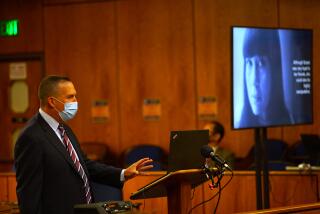Judge Delays General Dynamics Fraud Trial
- Share via
In a setback to federal prosecutors, a Los Angeles judge Monday indefinitely postponed the start of the scheduled trial of one of the nation’s biggest defense industry fraud cases.
U.S. District Judge Ferdinand Fernandez delayed the Oct. 14 trial of General Dynamics Corp. pending a review board’s decision on whether a contract to build an anti-aircraft system was too “ambiguous” to be clearly understood.
Describing defense industry regulations as “a web of laws and rules that almost defy understanding,” Fernandez referred the complex contract issues to the Armed Services Board of Contract Appeals in Washington.
“The court has already noted the contract appears to be ambiguous on its face,” Fernandez said.
General Dynamics and four former top officials are charged with conspiring to defraud the government of $3.2 million.
The decision by Fernandez was praised by lawyers for General Dynamics, who predicted that the review board could take from “six to 18 months” to decide if the contract was too ambiguous to be legally enforceable.
“We’re gratified that the judge agrees the contract is ambiguous,” defense attorney Stephen D. Miller said. “His comments go a long way toward the future acquittal of our clients.”
One of the prosecutors, Assistant U.S. Atty. J. Stephen Czuleger, said he was “disappointed” with the decision, but noted that Fernandez rejected a dozen other defense motions to dismiss the case immediately.
U.S. Atty. Robert C. Bonner consulted Monday with Justice Department officials on whether to immediately request the U.S. 9th Circuit Court of Appeals to overturn Fernandez’s ruling and order the trial to proceed on schedule.
“We are concerned the judge’s ruling is going to result in significant delays in our ability to get this case to trial,” Bonner said. “A further concern is that we are going to end up litigating a criminal fraud case outside the courtroom. They have essentially managed to transfer this case to a civil forum.”
While prosecutors had argued that key aspects of the case should not be submitted to a civilian review board, lawyers for General Dynamics and its former officials countered that the complexities of the contract issues required such expertise.
“Justice is at least as important as speed, and this is not an ordinary criminal case by any sense,” Fernandez said in making his ruling. “The board of contract disputes was created for the express need to resolve complex contract disputes.
“It is doubtful it would be just to require a long trial if the government theory is wrong,” he added. “On the other hand, if the government is right that the contract is clear, there is a need for the clarification the board would offer.”
General Dynamics and its former officials--including former National Aeronautics and Space Administration Director James M. Beggs--were indicted Dec. 2 on charges of conspiring to juggle company financial records to recoup millions of dollars in cost overruns on a $39-million contract to build two prototypes of a tank-mounted anti-aircraft weapons system.
The indictment said General Dynamics internally projected substantial cost overruns on its own books of nearly $7 million in 1978 and $6 million in 1979, but never reported those figures to the Defense Department. Instead, General Dynamics and the four individual defendants charged work and expenses required under the prototype contract to other government-funded accounts, which enabled the company to recoup about $3.2 million of its losses, the indictment said.
General Dynamics ultimately was not awarded the contract for the new anti-aircraft system, which went instead to the Ford Aerospace & Communications Corp. However, the Ford version of the anti-aircraft system, known as the Sgt. York, was also canceled by the Defense Department last year.
Response to Indictment
In responding to the indictment and requesting that the case be heard first by the Armed Services Board of Contract Appeals, lawyers for General Dynamics said the law required that the issue be submitted to “the specific government agency with the expertise to resolve” the question.
“The indictment alleges that certain work required to be performed by the prototype contract was improperly charged to General Dynamics’s Bid and Proposal and Independent Research and Development accounts,” the General Dynamics response said.
“Defendants maintain that the charges at issue were made in accordance with the governing regulations promulgated by the Department of Defense and, further, with the enunciated policy regarding such charges.”
Beggs, 59, was charged with participating in the alleged conspiracy while an executive vice president of General Dynamics’ Pomona Division before he took his NASA post in 1981. Following his indictment, Beggs first took a leave of absence from the space administration job, then resigned in March.
Also indicted were Ralph E. Hawes Jr., 54, of Claremont; David L. McPherson, 45, of Alta Loma, and James C. Hansen Jr., 53, of Upland. A spokesman for General Dynamics, headquartered in St. Louis, said they are all on paid leaves of absence.
More to Read
Inside the business of entertainment
The Wide Shot brings you news, analysis and insights on everything from streaming wars to production — and what it all means for the future.
You may occasionally receive promotional content from the Los Angeles Times.










